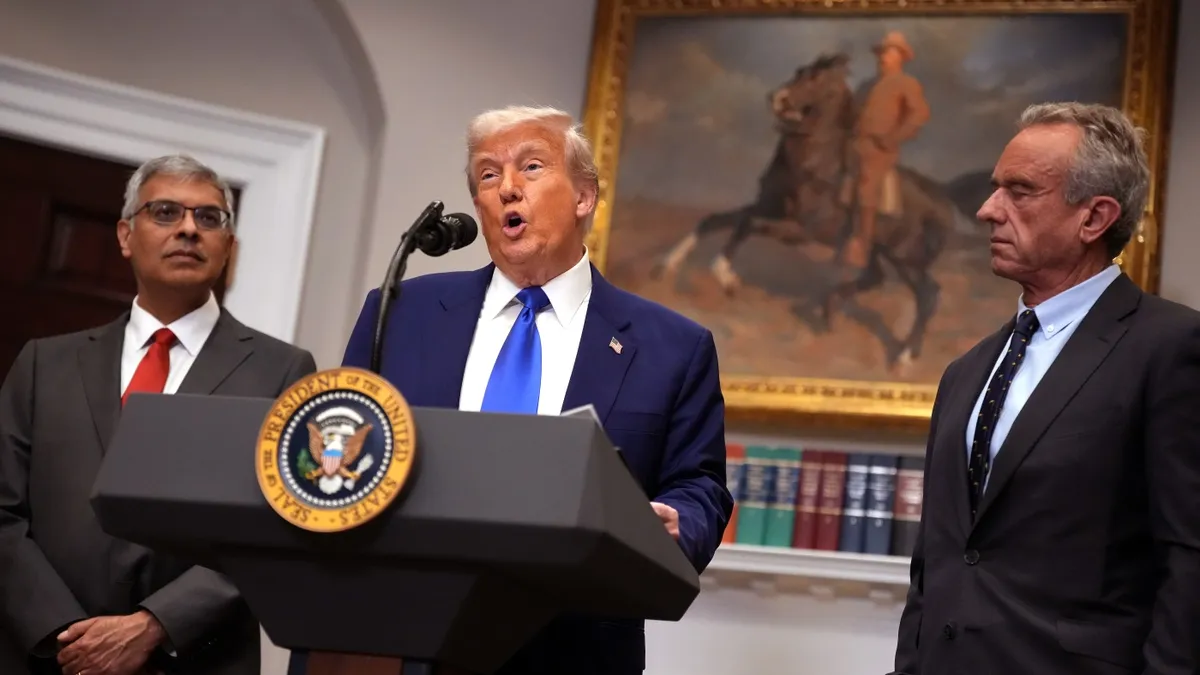
President Donald Trump is taking decisive action against soaring U.S. drug prices with a new executive order designed to compel pharmaceutical companies to align their pricing with lower rates found in other developed nations. This initiative, termed "most favored nation pricing," proposes that if drug manufacturers do not voluntarily reduce their prices, the government may tie Medicare drug prices to those paid in countries where prices are significantly lower.
During an announcement at the White House, Trump emphasized, "Whoever is paying the lowest price, that's the price that we're going to get." He made it clear that drugmakers would be required to lower their U.S. prices to levels that match those in other developed countries, or they would face substantial consequences. "If necessary, we'll investigate the drug companies," he added, outlining the administration's commitment to ensuring compliance.
In a bid to enhance competition and lower costs, the Trump administration plans to allow imports of medications from other nations. Patients in the U.S. typically face higher drug prices compared to those in countries with government healthcare systems that regulate prices. As Trump pointed out, "We've been subsidizing other countries throughout the world by paying higher prices." His comments were supported by leaders from various federal health agencies, highlighting the urgency of the situation.
The executive order outlines a comprehensive approach to tackle the issue of inflated drug costs. It instructs the U.S. Trade Representative and the Department of Commerce to address unreasonable pricing policies that favor lower drug prices abroad. However, the exact extent of the White House's authority in this matter remains unclear. Furthermore, the order mandates that Health and Human Services Secretary Robert F. Kennedy Jr. facilitate direct sales to consumers, enabling them to purchase medications at lower prices without the insurance intermediary.
Within the next 30 days, the administration is expected to communicate pricing targets to drugmakers, aiming to align U.S. prices with those of comparable developed nations. The order also specifies potential actions the administration could take if compliance is not achieved, including regulatory measures to enforce price reductions.
Despite Trump's optimism regarding the potential impacts of the executive order, industry leaders expressed concerns. The Pharmaceutical Research and Manufacturers of America (PhRMA) criticized the order as detrimental to American patients. PhRMA President and CEO Steve Ubl stated, "To lower costs for Americans, we need to address the real reasons U.S. prices are higher," emphasizing the role of foreign nations and intermediaries in inflating costs.
Trump has previously attempted to implement a similar policy during his first term, which faced legal challenges and was ultimately abandoned by the Biden administration. However, he has reiterated his commitment to reinstating the most favored nation pricing model. The Biden administration has recently begun negotiating Medicare drug prices under the Inflation Reduction Act, marking a significant shift in how drug prices are managed in the U.S.
Dr. Mehmet Oz, who leads the Centers for Medicare and Medicaid Services, highlighted during the announcement that even the newly negotiated Medicare prices are often higher than those found in Europe. He remarked, "Half the time we're paying three times more than is paid in other countries," underscoring the need for reform in the U.S. drug pricing system.
As the Trump administration moves forward with its executive order, the implications for the pharmaceutical industry and American patients remain significant. The ongoing negotiations for drug prices and the potential for importing medications could reshape the landscape of drug affordability in the United States.